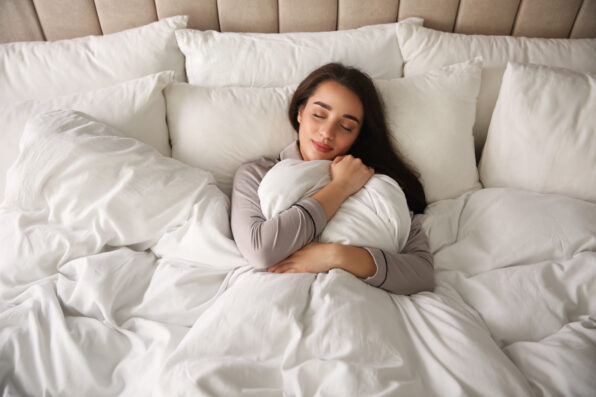
The following column is the opinion and analysis of the writer, Katharina Buczek.
Some partners might enjoy sleeping in the same bed together because they get to cuddle. But, what happens after that intimate time ends, your head hits the pillow, and you actually have to go to sleep?
Usually, a lot of blanket tugging, leg kicking, and complaining ensues. That’s why a growing number of couples have started to recognize the benefits of sleeping in separate beds.
You Might Need A “Sleep Divorce”
This separate bed trend has been coined “sleep divorce.” And while the term might sound pretty harsh, it sums up the idea quite literally.
After having honest conversations, more partners have agreed that they need some new sleep arrangements– more specifically, separate ones. This realization often comes after people realize their restful sleep is interrupted by having someone else in their bed.
Now, this may sound like a drastic idea– but rest assured that it is far from new. In fact, Queen Elizabeth and Prince Philip actually slept separately throughout the entirety of their marriage.
They realized how important true quality of sleep is. After all, how well we snooze can impact everything from our work and productivity to our relationships, motivation, and overall mental health.
So, ever since some couples have chosen to snooze separately, they have reported getting a better night’s rest. Plus, their personal relaxation time has even spilled over and positively impacted their relationship.

For some, this may sound too good to be true: getting an interrupted night of sleep and a more stable relationship.
But, just like everything in life, there are upsides and downsides to this sleeping arrangement. Let’s break them down, and then you can decide whether or not to incorporate “sleep divorce” into your relationship.
The Pros Of Sleep Divorce
First of all, if you or your partner are prone to disruptive sleep behaviors such as rolling around, talking in your sleep, snoring, or sweating, this can seriously impact sleep quality.
Then, your negatively-impacted sleep can bleed into other areas of your life– taking a toll on your stress and mood and ultimately causing more conflict in your relationship.
At the same time, if you or your partner are exhibiting disruptive behaviors, this can lead to harbored aggravation or even resentment.
In these cases, sleeping separately may be your best bet to kill two birds with one stone: giving you peace of mind and an uninhibited relationship.
On top of that, choosing to sleep away from your partner can also afford you both a bit of independence and personal space.
For some couples, having their own bed to retreat to at night can be a welcome break from constantly being in each other’s company. It can also help maintain a sense of individuality within the relationship.
The Cons Of Sleep Divorce
While sleeping separately may benefit your overall personal health, though, there are concerns about intimacy.
More specifically, if you enjoy the connection and feelings of closeness you experience with your partner while sleeping together, this may decrease if you take a separate bed.
Sharing a bed with your partner is ultimately a bonding experience, and sleeping apart may make it more challenging to connect on a physical and emotional level.
Communication opportunities may also decrease between you and your partner. For some busy couples, chatting in bed is really the only time they get to connect, reflect on their day, and discuss any issues or challenges. So, sleeping separately may make it more difficult to engage in these conversations.
How To Break The Ice Without Hurting Your Relationship
With all of this being said, there are plenty of ways to sleep separately without sacrificing connection and intimacy. This may just require an extra bit of effort and scheduling to block out other times for conversation and romance.
And if you feel like sleeping separately would really benefit your health and your relationship, it is best to be upfront.
Have an honest conversation with your partner to discuss your concerns and why sleeping alone might be best for you. Refrain from playing the blame game, and remember to emphasize the upsides.
You can also propose suggestions on how to mitigate other associated downsides. For instance, adding an extra date night to your weekly routine to prioritize romance or developing a new bedtime routine together to connect before heading your separate ways and hitting the sack.
Just remember to be open-minded and receptive to your partner’s feedback, and you both will be able to figure out a solution together.












